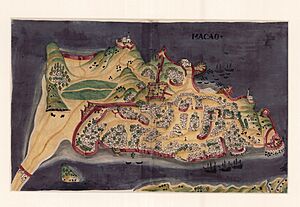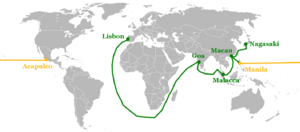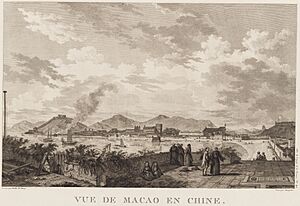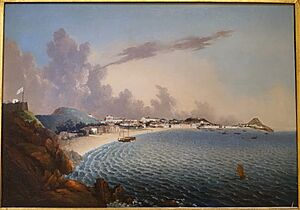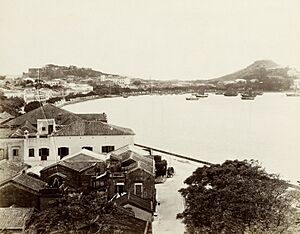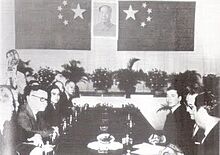History of Macau facts for kids
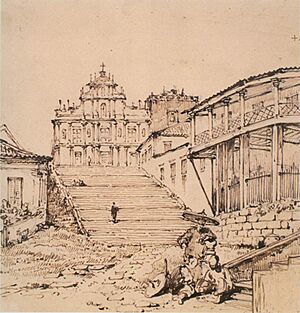
Macau is a special area in China called a Special Administrative Region (SAR). It was once leased to Portugal in 1557 as a place for trading. Portugal paid a small rent of 500 taels (a type of silver weight) each year. Even though China still owned Macau, Portugal started to treat it like its own colony. After some disagreements, Portugal finally got China to agree in 1887 that Macau was Portuguese land. In 1999, Macau was given back to China. It was the last European territory in mainland Asia.
Contents
- Early history of Macau
- Portuguese settlement in Macau
- Macau's golden age
- 1637–1844: Macau's decline
- 1844–1938: The Hong Kong effect
- 1938–1949: World War II in Macau
- 1949–1999: Macau and the People's Republic of China
- 1999: Handover to the People's Republic of China
- Recent history of Macau (1999–present)
- See also
Early history of Macau
The story of people living in Macau goes back about 6,000 years! We have found signs of human life and culture from 3,500 to 4,000 years ago on the Macau Peninsula and Coloane Island.
During the Qin dynasty (221–206 BC), Macau was part of a larger area called Panyu County. Later, during the Han dynasty, people started to settle there.
Since the 5th century, merchant ships traveling between Southeast Asia and Guangzhou used Macau as a safe harbor. They stopped there for fresh water and food. In 1152, during the Song dynasty, Macau became part of Xiangshan County. Later, in 1277, about 50,000 people who were escaping the Mongol conquest of China found a home in this coastal area.
Mong Há has always been a key place for Chinese people in Macau. It has what might be the oldest temple in the area, dedicated to Guanyin, the Buddhist Goddess of Mercy. Later, during the Ming dynasty, fishermen from Guangdong and Fujian provinces moved to Macau. They built the A-Ma Temple to pray for safety at sea. However, Macau didn't become a big settlement until the Portuguese arrived in the 1500s.
Portuguese settlement in Macau
During the Age of Discovery, Portuguese sailors explored the coasts of Africa and Asia. They set up trading posts in places like Goa (India) in 1510 and Malacca (Malaysia) in 1511. In 1513, Portuguese explorer Jorge Álvares reached Lintin Island in China's Pearl River Delta. He put up a stone marker to claim it for the King of Portugal. That same year, Rafael Perestrello sailed to China to start trade. He traded with Chinese merchants in Guangzhou in 1513 and 1516.
In 1517, Portugal's King Manuel I sent a team to Guangzhou to start official trade. But the Chinese Ming dynasty court wasn't interested in new foreign contacts. They had also heard bad things about Portuguese behavior in other parts of China.
In the 1520s, more Portuguese ships tried to trade near Guangzhou but were driven away by the Chinese. Good relations between the Portuguese and the Chinese Ming dynasty started again in the 1540s. This happened when the Portuguese helped China fight against pirates along the coast.
In 1557, the Ming court finally allowed Portugal to have a permanent trading base in Macau. They paid an annual rent of 500 taels of silver (about 20 kilograms or 44 pounds). The Portuguese built a walled village there. China still owned Macau, and Chinese people living there followed Chinese laws. But the Portuguese managed the area. They continued to pay this annual rent until 1863 to stay in Macau.
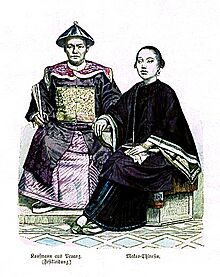
Portuguese men often married Tanka women, who were boat people, because Han Chinese women usually didn't marry foreigners. Some of the Tanka's children became the Macanese people, who are of mixed Chinese and Portuguese heritage.
Macau's golden age
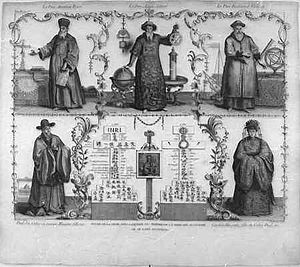
Once the Portuguese were allowed to live in Macau, both Chinese and Portuguese merchants came to the city. Macau quickly became a very important trading hub. It was a key stop on three main trade routes:
- Macau to Malacca (Malaysia), Goa (India), and Lisbon (Portugal).
- Guangzhou (China) to Macau to Nagasaki (Japan).
- Macau to Manila (Philippines) to Mexico.
The route between Guangzhou, Macau, and Nagasaki was especially profitable. The Portuguese acted as middlemen, selling Chinese silks to Japan and Japanese silver to China. They made a lot of money from this trade. This became even more profitable when Chinese officials gave Macau's Portuguese traders a monopoly (exclusive right) to trade with Japan in 1547. This happened because of piracy by Chinese and Japanese people.
Macau's golden age happened when Spain and Portugal were ruled by the same king, between 1580 and 1640. King Philip II of Spain allowed trade to continue between Portuguese Macau and Spanish Manila. In 1587, he even gave Macau the special title "City of the Name of God."
Because Portugal was allied with Spain, Portuguese colonies became targets for the Netherlands. The Dutch were fighting for their independence from Spain. The Dutch East India Company attacked Macau several times. The biggest attack was in 1622, when 800 Dutch attackers were stopped by only 150 Macanese and Portuguese defenders, along with many African slaves. After this, Macau's governor built stronger defenses, including the Guia Fortress.
Religious activity in Macau
Besides being a trading post, Macau was also a center for Catholic missionaries. They saw it as a way to spread Christianity to China and Japan. Jesuits arrived in the 1560s, followed by Dominicans in the 1580s. Both groups built churches and schools. The most famous ones were the Jesuit Cathedral of Saint Paul and the St. Dominic's Church. In 1576, Macau became an important religious center with its own bishop.
1637–1844: Macau's decline
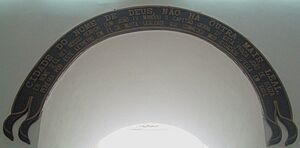
In 1637, Japan became very suspicious of Spanish and Portuguese Catholic missionaries. This led the Japanese ruler, the shōgun, to close Japan off from foreign influence. This period was called sakoku. It meant no Japanese could leave the country, and almost no foreign ships could enter Japanese ports. Only the Protestant Dutch were allowed to trade from a small island in Nagasaki. This stopped Macau's most profitable trade route, the one between Japan and China. The situation got worse when the Dutch took Malacca from Portugal in 1641, hurting Macau's connection with Goa.
It took two years for Macau to hear that Portugal had a new king, João IV, who had taken back control from Spain. When the news arrived in 1642, Macau celebrated for ten weeks! Even though it was now poorer, Macau sent gifts to the new king. In return, the king added the words "There is none more Loyal" to Macau's title. So, Macau became "City of the Name of God, Macau, There is none more loyal."
In 1685, Portugal's special trading position with China ended. The Chinese Kangxi Emperor decided to allow all foreign countries to trade. Over the next 100 years, countries like Britain, the Netherlands, France, and the United States set up offices in Guangzhou and Macau.
Until 1844, Macau was part of Portugal's colonies in India. But after that, Portugal recognized Macau (and East Timor) as its own overseas province. China, however, did not agree with this.
The Treaty of Wanghia (a peace and trade agreement between China and the United States) was signed in a temple in Macau on July 3, 1844. This temple was in the village of Mong Há. This treaty marked the official start of relations between China and the United States.
1844–1938: The Hong Kong effect
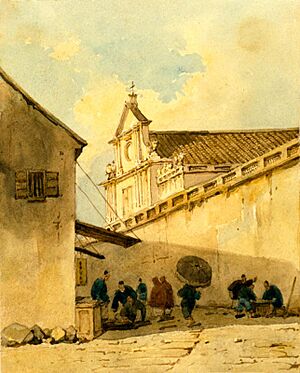
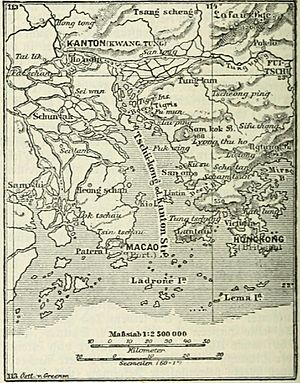
After China gave Hong Kong to the British in 1842, Macau's importance as a trading center decreased. This was because larger ships preferred Hong Kong's deep-water port. In 1846, Portugal sent João Maria Ferreira do Amaral to be the governor of Macau. He declared Macau a Portuguese colony on his own, stopped paying rent to China, and took over the nearby island of Taipa. He also created new taxes for Macau residents. In 1846, there was a small uprising by boatmen that was stopped.
Governor Amaral was later killed by Chinese villagers in 1849. The Portuguese reacted by attacking a nearby Chinese fort. This event was important because it showed Portugal's strong claim over Macau. Portugal gained control of the island of Wanzai in 1849 but gave it up in 1887. Control over Taipa and Coloane, two islands south of Macau, was gained between 1851 and 1864. In 1887, a treaty confirmed Portugal's "perpetual occupation and government" of Macau. Taipa and Coloane were also given to Portugal.
In 1871, the Hospital Kiang Wu was founded as a traditional Chinese hospital. In 1892, Dr. Sun Yat-sen introduced Western medicine services to the hospital.
In the 1930s, Macau's local industries like fishing and making firecrackers were small. The government's income from gambling was also not very high. So, the Portuguese government wanted Macau to become more self-sufficient. One way was to become a transit point for new flights across the Pacific Ocean. In 1935, Pan-Am got permission to land seaplanes in Macau. This allowed flights from San Francisco to start that November.
1848–1870s: The coolie trade
From 1848 to the early 1870s, Macau was a well-known port for the trade of "coolies," who were Chinese laborers. Between 1851 and 1874, about 215,000 Chinese people were sent overseas from Macau, mostly to Cuba and Peru. These laborers were sometimes tricked by brokers in Macau through gambling debts, or they were forced to go.
1938–1949: World War II in Macau
Macau became a safe place for refugees during World War II. Its population grew from about 200,000 to 700,000 people in just a few years.
Unlike Portuguese Timor, which Japan occupied, the Japanese mostly respected Portugal's neutrality in Macau. This meant Macau had a short period of economic success. It was the only neutral port in South China after the Japanese took over Guangzhou and Hong Kong. However, in August 1943, Japanese troops took a British ship in Macau and killed some guards. The next month, they demanded to have Japanese "advisors" in Macau, or they would occupy it. This created a situation where Japan had a lot of control over Macau.
On June 26, 1942, a Portuguese plane crashed into a neighborhood in Macau, killing the two people on board and one person on the ground. This was the only fatal plane accident in Macau's history.
Portugal was neutral during World War II and did not sign the 1944 Bretton-Woods Agreement. This agreement controlled gold prices. Because of this, Macau became a perfect place for the illegal gold trade for those who wanted to avoid these price controls. After the U.S. stopped following the Bretton Woods System in 1971, Macau's importance in the gold trade decreased, and the illegal trade ended in 1974.
When it was discovered that neutral Macau planned to sell airplane fuel to Japan, American planes from the USS Enterprise bombed a hangar in Macau on January 16, 1945, to destroy the fuel. More American air raids happened on February 25 and June 11, 1945. After Portugal protested in 1950, the United States paid over $20 million in compensation to the Portuguese government.
1949–1999: Macau and the People's Republic of China
When the Chinese Communist Party came to power in 1949, they said the agreement about Macau was an "unequal treaty" forced on China. However, China decided to keep the "status quo" (things as they were) for a while. They did the same for Hong Kong.
After World War II, the United Nations wanted its member countries to give up their colonies. Portugal's Prime Minister António de Oliveira Salazar tried to keep Macau. In 1951, Portugal changed its constitution to call Macau an "overseas province" instead of a colony. They saw it as part of Portugal itself.
During the Korean War, Macau was a key place for certain trade activities into China. After the war, Macau became an important unofficial link for North Korea's financial interests.
In the 1950s and 1960s, Macau's border with China, Portas do Cerco, was sometimes called Far Eastern Checkpoint Charlie. In 1952, there was a border incident where Portuguese troops and Chinese border guards exchanged fire. Reports said it lasted for almost two hours, with casualties on both sides.
In 1954, the Macau Grand Prix started. It was first a treasure hunt and later became a famous car racing event.
In 1962, Macau's gambling industry changed a lot. The government gave a company called Sociedade de Turismo e Diversões de Macau (STDM) the sole right to run all gambling. STDM brought in Western-style games and improved transport between Macau and Hong Kong, attracting millions of gamblers.
In 1966, during China's Cultural Revolution, there were riots in Macau. The most serious was the 12-3 incident. This happened because of a disagreement over building a new school wing. The government sent police, and people were injured. On December 3, 1966, two days of riots took place, injuring hundreds and killing several people. This led to the Portuguese government giving in to demands. This event started the process of Portugal giving up control over Macau.
On January 29, 1967, the Portuguese governor of Macau signed an apology statement at the Chinese Chamber of Commerce, under a picture of Mao Zedong.
Two agreements were signed. One with Macau's Chinese community, and another with mainland China. The government agreed to pay compensation and to stop all activities of the Kuomintang (a Chinese political party) in Macau. This ended the conflict and improved relations.
After the 1974 Carnation Revolution in Portugal, the country started to give up its colonies. Over the next few years, Portugal offered twice to return Macau to China, but China refused both times. In 1979, Portugal and China started official diplomatic relations. They made a secret agreement to call Macau "Chinese territory under Portuguese administration."
In 1994, the Bridge of Friendship was finished. It was the second bridge connecting Macau and Taipa. In November 1995, the Macau International Airport opened. Before this, Macau only had small temporary airports and heliports. In 1997, the Macau Stadium was completed in Taipa.
1999: Handover to the People's Republic of China
Portugal and China officially started diplomatic relations on February 8, 1979. China agreed that Macau was "Chinese territory under Portuguese administration." A year later, General Melo Egidio became the first governor of Macau to visit Beijing.
This visit showed that both sides wanted to find a good solution for Macau's future. In 1986, they agreed to start talks about Macau. Four rounds of talks happened between 1986 and 1987. The Joint Declaration on the Question of Macau was signed in Beijing on April 13, 1987. This agreement set the date for Macau to return to full Chinese control as a Special Administrative Region on December 20, 1999.
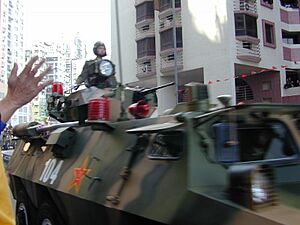
After the talks, the "Joint Declaration" was officially signed in April 1987. This agreement became official on January 15, 1988. During the time between the agreement and December 19, 1999, the Portuguese government was in charge of Macau.
The Macau Basic Law, which is like Macau's mini-constitution, was approved in 1993 and became effective on December 20, 1999.
China has promised that under its "one country, two systems" plan, Macau will not use China's socialist economic system. Macau will have a lot of freedom in most matters, except for foreign affairs and defense, until at least 2049.
When Macau was handed over, it marked the end of European colonization in Asia.
Recent history of Macau (1999–present)
1999–2007: Macau becomes the Las Vegas of Asia
In 2002, the Macau government ended the gambling monopoly. This meant that other companies could open casinos. Six casino licenses were given out. This started Macau's rise as a major gambling center in Asia.
To help the gambling industry grow, the Cotai reclamation project was finished after the handover. Building hotels and casinos started in 2004. In 2007, the first of many resorts, The Venetian Macao, opened. Many other resorts followed, bringing a lot of tax money to the Macau government and reducing unemployment to a very low 2% by 2013.
In 2004, the Sai Van Bridge was completed. It was the third bridge connecting Macau island and Taipa island. In 2005, the Macau East Asian Games Dome, a main venue for the 4th East Asian Games, was opened. Also in 2005, the Macau government started building a lot of social housing, creating over 8,000 apartment units.
2007–2008: The Financial Crisis hits Macau
Like other places in the world, Macau was affected by the financial crisis of 2007–08. This caused a slowdown in major construction projects and an increase in unemployment.
2008–2013: Expansion into Hengqin and more casinos
Because Macau has limited space, the government announced in 2009 that the University of Macau would build its new campus on Hengqin island, right across from the Cotai area. Several other housing and business projects are also planned for Hengqin.
From 2011 to 2013, more large resorts started construction in Cotai.
2014–present: Slowdown in gambling and economic changes
In 2014, for the first time, Macau's gambling income decreased compared to the previous year. This led to the Macau Daily Times announcing that the "Decade of gambling expansion end[ed]." Some reasons for this slowdown included China's anti-corruption efforts, China's economy slowing down, and Chinese tourists choosing to visit other countries.
This made the Macau government try to change its economy. They wanted to rely less on gambling and focus on building world-class tourism and leisure centers that were not just about gambling. They also wanted to make Macau a platform for trade between China and countries that speak Portuguese.
In 2015, Macau's borders were changed. The land border moved north, and the sea border grew much larger, adding 85 square kilometers of sea territory.
Typhoon Hato hit Southern China in August 2017, causing a lot of damage in Macau. There was major flooding and property damage, with city-wide power and water outages lasting for at least 24 hours. Sadly, 10 people died and at least 200 were injured. This caused anger towards the Macau government, who were accused of not being ready for the typhoon. The head of the weather bureau resigned. At Macau's request, the People's Liberation Army Macau Garrison (Chinese army) sent about 1,000 troops to help with disaster relief and cleaning up. This was the first time the army had been deployed in Macau's history.
On December 12, 2019, Macau officially opened its first train system, the Macau Light Rapid Transit.
Overall, Macau was one of the safest places during the COVID-19 pandemic, with very few infections. However, the pandemic greatly slowed down Macau's economy, which relies heavily on casinos.
See also
 In Spanish: Historia de Macao para niños
In Spanish: Historia de Macao para niños
- Culture of Macau
- Gambling in Macau
- History of Hong Kong
- Names of Macau
- Religion in Macau
 | Delilah Pierce |
 | Gordon Parks |
 | Augusta Savage |
 | Charles Ethan Porter |


